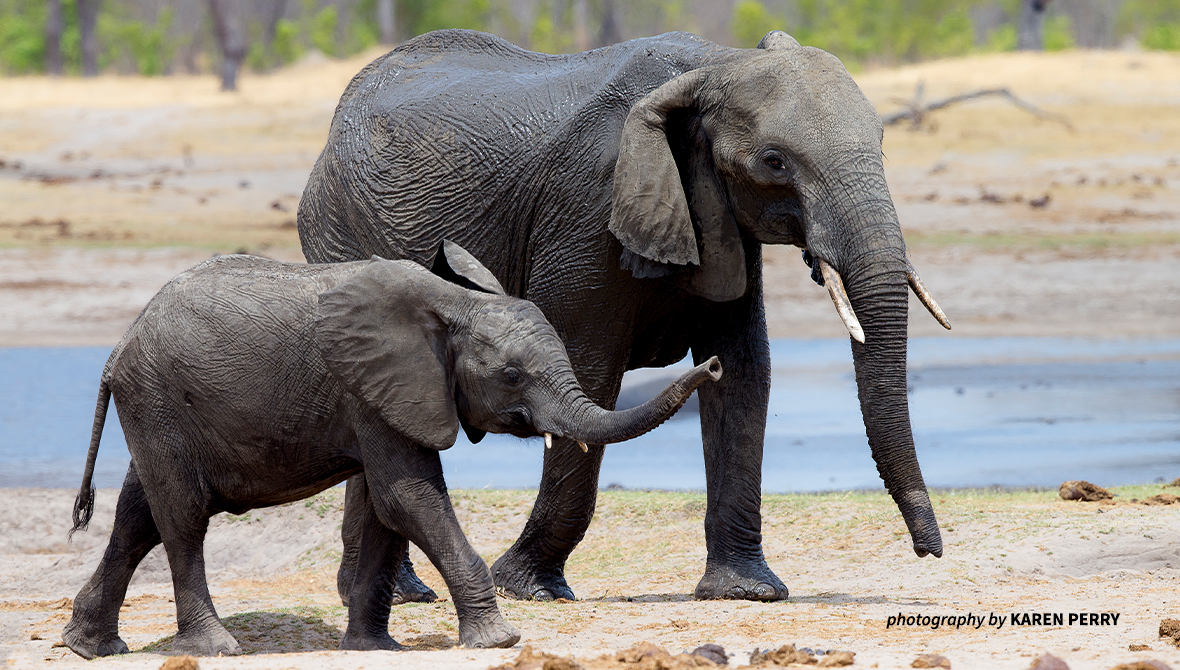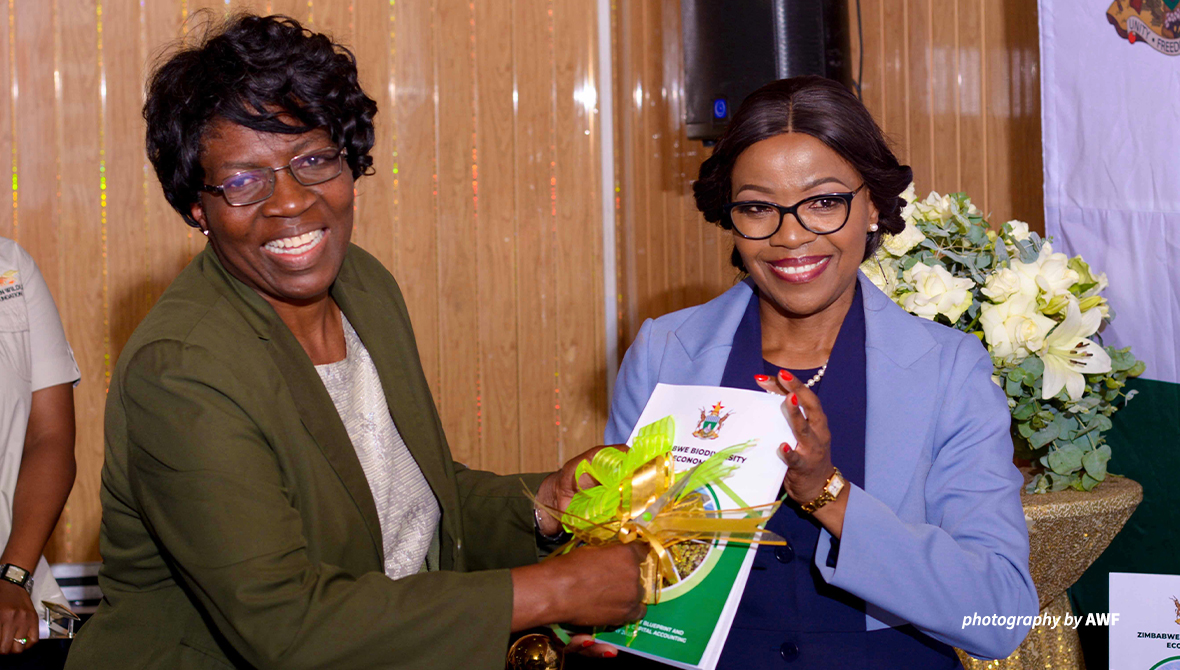Unleashing Zimbabwe's Biodiversity Economy: A Path to Sustainable Development

Animals, plants, and fungi have the potential to create wealth and drive sustainable development.
Zimbabwe, a land blessed with breathtaking biodiversity and rich ecosystems, holds incredible economic growth and sustainable development potential. However, conventional methods of measuring economic success fail to recognize the value of the country's natural assets and their essential services. To address this issue, the Zimbabwe Ministry of Environment, Climate, Tourism, and Hospitality Industry (MECTHI), in collaboration with the African Wildlife Foundation, embarked on a transformative journey in 2021. Their goal was to assess the contribution of biodiversity to the nation's economy, livelihoods, and social well-being, paving the way for Zimbabwe to unlock the full potential of its biodiversity economy and achieve its vision of becoming an upper-middle-income economy by 2030. The biodiversity economy uses indigenous plants and animals as an asset to create wealth and drive sustainable economic development while ensuring that negative impacts on the environment are avoided and minimized.
Recognizing the Value of Biodiversity
On September 13, the Zimbabwe Biodiversity Economy (ZBE) was launched, providing a comprehensive baseline framework to measure and track the economic contributions of biodiversity and its associated ecosystem services. The ZBE offers an overview of Zimbabwe's biodiversity economy and presents a feasibility framework for natural capital accounting and an investment blueprint to identify and leverage opportunities within the biodiversity sector.
Despite playing a vital role in Zimbabwe, the contributions of biodiversity are often overlooked in economic assessments. Most goods and services provided by biodiversity are not accounted for in the country's GDP estimates due to the absence of a comprehensive framework for measuring and integrating biodiversity contributions into national economic accounts. Consequently, the significance of biodiversity is undervalued, leading to overexploitation and inadequate investment in its protection, conservation, and restoration. This shortsighted approach ultimately results in unprecedented biodiversity loss, undermining the foundation needed for sustainable development. By integrating biodiversity into development planning and national economic accounts, decision-makers can make informed choices prioritizing long-term sustainability.
Unlocking Opportunities for Growth
The ZBE highlights numerous economic growth and development opportunities within Zimbabwe's biodiversity economy. Nature-based tourism, wildlife-based land use, commercialization of non-timber forest products, and the expansion of fisheries in small water bodies are just a few examples of potential avenues for advancement. These sectors generate revenue and provide employment opportunities, particularly in rural communities.
Zimbabwe's biodiversity economy aligns with five Sustainable Development Goals (SDGs 11-15) focused on environmental protection. By prioritizing four biodiversity economy subsectors—bioprospecting and biotrade, fisheries, forestry, and wildlife—the government aims to unlock the wealth within these sectors while simultaneously addressing environmental objectives in these SDGs and incentivizing conservation of biodiversity resources. For instance, The ZBE estimates that the value of NTFPs utilized for subsistence in Zimbabwe is US$500 million annually. Commercializing non-timber forest products like honey, mushrooms, and wild fruits can create substantial economic value, which can spur economic development and incentivize conservation. The assessment further indicates that nature-based tourism contributed US$878 million, or about 70% of total tourism receipts, in the country in 2019. It contributed almost 6% to national employment and 4% of GDP. However, such contributions fall short of their full potential because opportunities in remote national parks and resettlement areas are not fully realized. If such potential is unlocked, this would drive development and encourage conservation of biodiversity resources upon which the development is predicated.
The ZBE has set Zimbabwe on a path to harness the opportunities its biodiversity economy presents. To achieve this, the ZBE recommends devolving authority to local communities, establishing dedicated institutions, combating negative perceptions, implementing agricultural reforms, formulating fisheries policies, and enhancing access and benefit sharing. Through these measures, Zimbabwe can fully leverage its biodiversity and achieve sustainable development goals, bringing its vision of a prosperous future to fruition.
Unleashing Zimbabwe's biodiversity economy is a crucial step towards sustainable development and achieving the nation's vision for the future. By recognizing the true value of biodiversity, integrating it into economic planning, and embracing growth opportunities, Zimbabwe can pave the way for a prosperous and environmentally conscious future. Moreover, by understanding the potential of biodiversity economies, not just in Zimbabwe but across Africa, we can unlock a new paradigm of development that harmoniously balances economic progress with environmental preservation.

The Zimbabwe Biodiversity Economy report was launched on September 13
With appropriate business and investment models, biodiversity economy provides Africa a channel to galvanize profit-seeking private sector resources into conservation, thus reducing the burden on public finance, which has traditionally disproportionately funded conservation. For the private sector, biodiversity economy provides an avenue to meet the ‘triple bottom line’—positive impacts on people, the environment, and the economy.
Unlocking the biodiversity economies of Africa holds the key to a future of sustainable and inclusive economic development. The African Wildlife Foundation firmly believes in the continent's potential to embrace biodiversity as a valuable asset rather than a burden. Africa can unlock immense local, national, regional, and global economic opportunities by harnessing intact ecosystems and thriving wildlife populations. However, many African governments have not recognized the true value of wildlife and ecosystems, resulting in insufficient investment in these resources.
Unlocking Africa's Biodiversity Economies
Like Zimbabwe, many African countries lack detailed analyses that showcase the full potential of wildlife economies. AWF aims to address this by providing research and data highlighting biodiversity's economic contributions. By demonstrating the immense value that wildlife economies can bring, decision-makers at all levels can be empowered to view biodiversity as a strategic asset and invest in its sustainable development. This paradigm shift will attract young Africans, foster private sector investment, involve local communities, and increase their benefits.
Taking inspiration from the successful example set by Zimbabwe, AWF is committed to supporting governments and stakeholders in assessing and analyzing the status of biodiversity economies. By utilizing the data and information gathered, countries will have awareness, showcase the contributions to economies and livelihoods, and develop roadmaps and investment blueprints for sustainable development.
Africa's biodiversity is a treasure that can drive economic growth, protect ecosystems, and uplift communities. By recognizing the true value of biodiversity and ecosystems and investing in their sustainable management, Africa can forge a prosperous future that harmonizes economic progress with environmental conservation. The time is now to unlock Africa's biodiversity economies and unleash their immense potential for the benefit of current and future generations.
Wellington Matsika contributed to this article